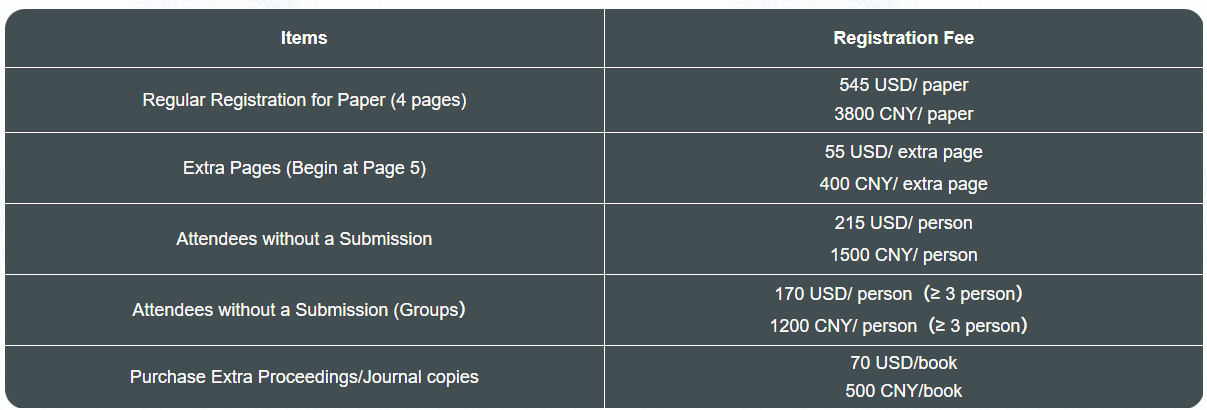

2026 International Conference on Embedded Systems, Mobile Communication and Computing (EMC² 2026)
January 12-14, 2026, Hong Kong - China ic-emcc.org/

 Important Information
Important Information
Official Website of the Conference:ic-emcc.org
Conference Time:January 12-14, 2026
Conference Venue:Hong Kong - China
Notification of Acceptance/Rejection:1 week after submission
Inclusion and Retrieval:IEEE Xplore, EI Compendex,Scopus
 Conference Introduction
Conference Introduction
2026 International Conference on Embedded Systems, Mobile Communication and Computing (EMC² 2026) will be held on January 12-14, 2026 in Hong Kong, China.
The goal of EMC² is to promote the research and developmental activities in Embedded Systems, Mobile Communication and Computing and another goal is to promote scientific information interchange between researchers, developers, engineers, students, and practitioners working all around the world. The conference will be held to make it an ideal platform for people to share views and experiences in Embedded Systems, Mobile Communication and Computing and related areas.
This conference focuses on Embedded Systems, Mobile Communication and Computing, aiming to provide a platform for experts and scholars, engineers and researchers to share scientific research results and cutting-edge technologies, understand academic development trends, broaden research ideas, strengthen academic research and discussion, and promote cooperation in the industrialization of academic achievements.
We look forward to seeing you!
 Sponsor
Sponsor

The University of Hong Kong, Asia's Global University, delivers impact through internationalisation, innovation and interdisciplinarity. It attracts and nurtures global scholars through excellence in research, teaching and learning, and knowledge exchange. It makes a positive social contribution through global presence, regional significance and engagement with the rest of China.
 Call for Papers
Call for Papers
1. Innovative Applications of Embedded Systems in Intelligent IoT
- Internet of Things (IoT) and Embedded Systems
- Embedded Processors and System-on-Chip (SoC) Design
- TinyML Applications on Embedded IoT Nodes
- Embedded Sensing and Perception Systems
- Edge-AI Healthcare and Wearable Devices
- Mobile Intelligent Devices and Human–Machine Interaction
- Smart Cities and Intelligent Transportation with Embedded Systems
- Industrial IoT and Cybersecure Embedded Architectures
- Collaborative Robotics and Autonomous Embedded Systems
2. Energy Efficiency Optimization Technologies for 5G/6G Mobile Communication Networks
- Energy-efficient radio resource allocation and scheduling for 5G/6G mobile communication networks
- Energy-efficient waveform/coding/modulation designs for 5G/6G mobile communication networks
- Advanced radio access network architectures and control mechanisms for energy-efficient 5G/6G mobile communication networks
- Machine learning/artificial intelligence empowers energy-efficient 5G/6G mobile communication networks
- Energy-efficient designs for mobility and handover management
- Energy-efficient designs for MIMO/massive MIMO/extremely large-scale MIMO systems
- Energy harvesting and renewable-powered 5G/6G mobile communication networks
- Reconfigurable intelligent surface and movable/fluid antennas for energy efficiency
- Energy-efficient designs for UAV communications
3. Co-Design of Edge Computing and Embedded Systems
- Architectural Design of Intelligent Embedded Systems for Edge Computing
- Collaborative Design of Edge Computing and Embedded Systems with Integration of Sensing, Communication, and Computing
- Edge Lightweight Containers and Edge Virtualization Technologies for Embedded Systems
- Edge Intelligent Offloading and Caching Strategies for Embedded Systems
- Online Learning and Incremental Learning Technologies for Embedded Systems
- Edge Model Lightweight Deployment and Neural Network Compression Technologies
- Edge Multimodal Data Sensing Technologies
- Edge Deployment Technologies of LLM
4. Distributed Data Processing Technologies in Mobile Computing
- Distributed Clock and Synchronization Technology for Cross-Domain Integrated Sensing and Communications
- Distributed Data Collaboration Technology for Low-Altitude Communications Driven by Federated Learning
- Distributed Edge Caching Optimization Under Terahertz Communications
- AI-Assisted Elastic Allocation of Distributed Sensing and Communication Resources
- Distributed Channel Cooperative Transmission Based on Reconfigurable Intelligent Surfaces (RIS)
- Distributed Mobile Transmission with Fog-Edge-Cloud Collaboration
- Distributed Lightweight Data Deployment in Low Earth Orbit (LEO) Constellations
- Distributed Scheduling-Free Multiple Access for Ultra-Massive Connectivity
5. Big Data Analysis and Mining in Mobile Computing Environments
- Mobile network data analytics for traffic optimization and anomaly detection in 6G networks
- Mobile edge and fog computing for big data analysis
- On-device deployment and fine-tuning of large language models (LLMs)
- Lightweight machine learning for resource-constrained devices
- Time-series and spatio-temporal data mining
- Federated learning and privacy-preserving distributed learning frameworks
- Multi-modal context sensing and data fusion
- Human activity recognition and behavior modeling using smartphones and wearable devices
- User profiling and personalized services based on mobile behavior
- Architectures for mobile-edge-cloud computing convergence
- Efficient task offloading and data caching strategies in MEC environments
- Data management and processing for large-scale mobile data
- System prototypes and testbeds for mobile big data applications
- Intelligent transportation, crowd management, and smart city planning
- Cross-domain data fusion and knowledge discovery
6. Development of Millimeter Wave and Terahertz Mobile Communication Technologies
- Propagation modeling and channel characterization in mmWave/THz bands
- Antenna array architectures, reconfigurable intelligent surfaces (RIS), pinching antenna, and beamforming techniques
- Modulation, waveform design, and multiple access strategies for mmWave/THz communications
- Hardware design challenges: RF front-end, mixed-signal processing, and integration technologies
- Energy-efficient transmission, resource allocation, and network optimization
- Cross-layer design and architecture innovations for mmWave/THz mobile networks
- Applications in mmWave and THz networks, integrated sensing and communication (ISAC), IoT, and vehicular systems
7. The New-Generation Low-Altitude Communications Technologies
- Information-Theoretic Foundations and Performance Limits for Low-Altitude Networks;
- Channel Modeling and Propagation Characteristics for Low-Altitude Communications;
- Advanced Signal Processing and Transmission Technologies for Low-Altitude Communications;
- Waveform Design and Optimization for ISAC in Low-Altitude Communications;
- AI-Enabled Resource Management for Low-Altitude Networks;
- Flexible Antenna-Enabled Low-Altitude Communications;
- Testing, Validation, and Standardization for Low-Altitude Communications.
8. Acceleration Theory and Applications of Mobile and Edge Computing Intelligence
- Model Compression, Pruning, and Edge Runtime Optimization
- Accelerating Computation and Sampling for Mobile/Edge Generative AI
- Real-Time Statistical Inference and Explainability in Mobile/Edge AI
- Efficient Fine-Tuning and Deployment of Large Models on Mobile/Edge Devices
- Communication Scheduling Optimization for Decentralized and Federated Learning
- Edge Intelligence Applications in Augmented/Virtual Reality and Digital Twins
- Energy Efficiency and Hardware-Software Co-Design for Mobile/Edge AI
9. Modeling and Computational Methods for Social Behavior in Multi-Agent Systems
- Theoretical frameworks and methods for social behavior modeling
- Agent cognition and decision-making mechanism design
- Large-scale social simulation algorithms and optimization
- Applications of LLMs in social behavior modeling
- Collective intelligence and group decision-making mechanisms
- Social network dynamics and evolutionary models
- Interdisciplinary validation methods and empirical studies
10. Embodied Intelligence for Medical Robotics
- Theories of Embodied Intelligence and Cognitive Models for Medical Robots
- Multi-Modal Perception and Situational Awareness for Medical Robots
- Dexterous Manipulation and Adaptive Control for Surgical Robotics
- Human-Robot Collaboration and Shared Control in Intelligent Diagnosis and Therapy
- Personalized Embodied Interaction for Rehabilitation and Nursing Robots
- Autonomous Navigation and Mobile Manipulation for Medical Robots
- Simulation, Verification, and Standardization Frameworks for Medical Robotics
11. Embodied Intelligence for Medical Robotics
- Generative AI Models and Algorithms for Edge Devices
- Multi-Agent Coordination Mechanisms in Edge Computing
- Privacy and Security in Collaborative Edge Intelligence
- Resource Management and Task Scheduling for Multi-Agent Edge Systems
- Real-world Applications of Generative AI and Multi-Agent Collaboration at the Edge
- Challenges and Future Directions in Intelligent Edge Collaboration
 Paper Publication
Paper Publication
All papers will be reviewed by two or three expert reviewers from the conference committees. After a careful reviewing process, all accepted papers will be published by IEEE(ISBN: 979-8-3315-7708-7) and will be submitted to IEEE Xplore, EI Compendex, Scopus for indexing.
◆Thesis shall not be less than 4 pages。
----------------------------------------------------------------------------------------------------------------------------------------------
& Please register the accepted thesis in time. If it is overdue, it will give up publishing by default。
& Papers shall be typeset according to the conference paper template, and submissions shall be submitted in WORD and PDF format, which shall not be less than 6 pages。
& Thesis shall be of academic or practical value and have never been published in any domestic or foreign journals or conferences. Authors can check duplicates at their own expense through CrossCheck, Turnitin (the duplicate checking rate is lower than 30%) or other query systems. If the publishing house refuses to do so due to the article repetition rate, the author shall bear the responsibility. Papers that confirm academic fraud will not be published and will be published on the conference homepage.
 Conference Agenda
Conference Agenda
| Day 1- January 12, 2026 14:00-18:00 Equipment Testing |
| Day 2- January 13, 2026
|
| Day 3- January 14, 2026 09:00-18:00 Academic Discussion |
 Registration Fee
Registration Fee

 Mode of participation
Mode of participation
1. At least one author for each accepted final paper must pre-register.
2. The registration fee does not include: ① Accommodation ② Visa application fee ③ Transportation fare.
3. And at least 30% of the registration fee will be charged as the service fee if you retract your paper for personal reasons.
 Conference Accommodation
Conference Accommodation
EMC² 2026 will will be held at the University of Hong Kong from 12 to 14 January 2026.
For further information about the hotel, please find the below.
Ⅰ. Information:
Best Western Plus Hotel Hong Kong
Hotel Website:click
Tel:+852-34103333
Address: 308 Des Voeux Road West, Sai Wan, Central and Western District
>> Superior room: RMB 659/ night (about USD 91/ night).(One bed, Internet and one breakfast included)
>> Superior Suite: RMB 732/night (about USD 103/ night). (Two beds, Internet and two breakfast included)
* Note: Specific prices are subject to the official hotel website.
Ⅱ. Room Booking:
You may make a reservation via the official hotel
Ⅲ. Direction:
*Hong Kong International Airport: 35 km, 33 min
*Hong Kong West Kowloon Station: 6 km, 14min
Ⅳ. Tips:
For non-Chinese Attendees, "Bring me to the hotel" card is available. You can show it to the taxi drivers and they will take you to the hotel.

 Contact us
Contact us
 |
 |
| Hanna He Whatsapp: +86 13794043062 QQ: 3309133821 |
E-Mail: emcc2026@163.com |





